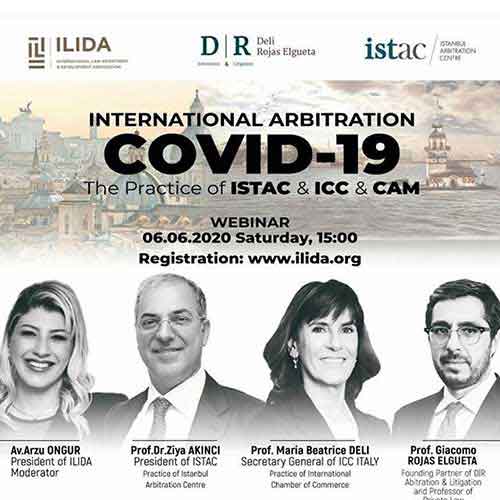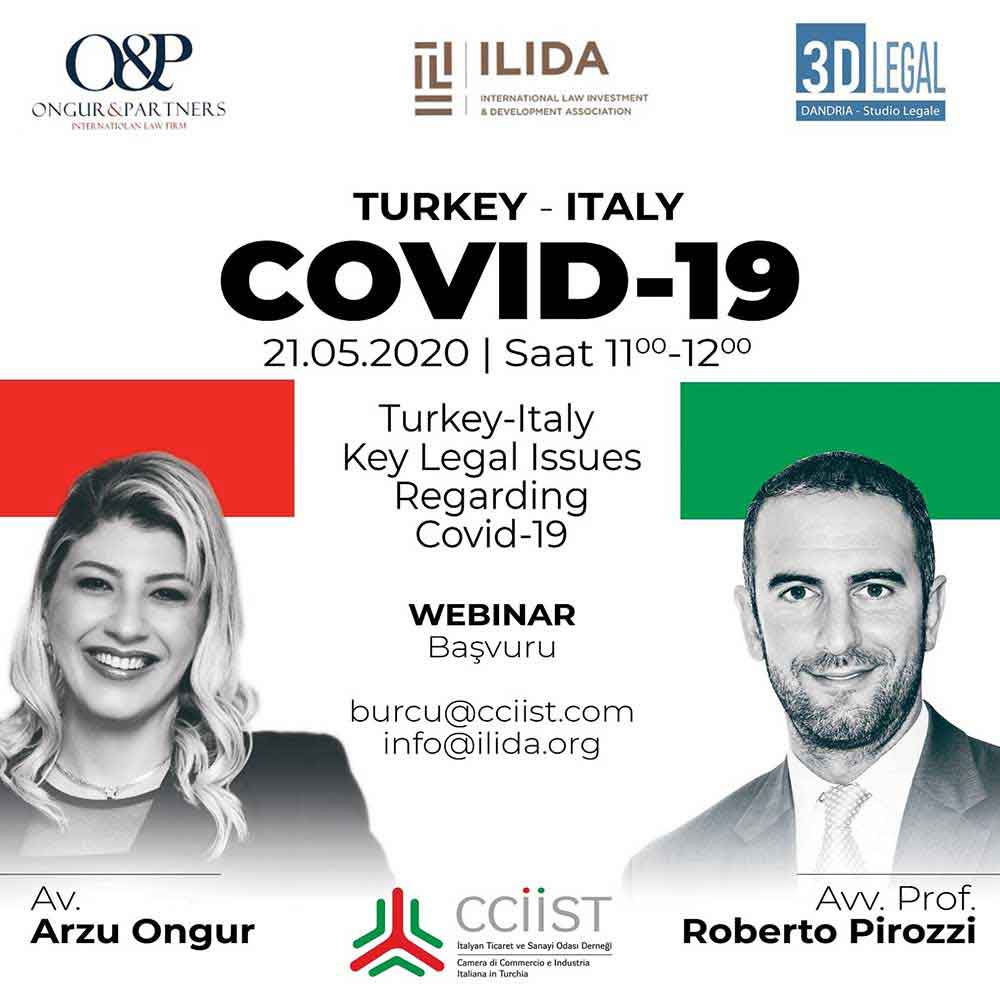
ONGUR & PARTNERS is an active member of several prestigious legal and business institutions:
- International Bar Association (IBA)
- Turkish Bar Union (TBB)
- Ankara Bar Association (ABA)
- Italian Chamber of Commerce and Industry (CCIIST)
- International Law and Investment Association (ILIDA)





OUR TEAM
ONGUR & PARTNERS - AWARD WINNER LEADING LAW FIRM IN TURKEY
Global Standards
Local Expertise
Trusted Legal Solutions
International Arbitration Lawyer
International arbitration is an indispensable mechanism for resolving the increasing number of disputes due to the development of supply chains and the rapid growth of global trade. For the stakeholders of global trade and investment, it is preferred to resolve the disputes that arise in an effective, effective, fast and enforceable manner.
International securities arbitration lawyer, on the other hand, is becoming more and more common day by day as a dispute resolution method that responds to exactly these needs. Of course, with the spread of this dispute resolution method, the interest and need for international arbitration lawyers, who are expected to have a high knowledge of international law, understand cultural differences and have developed themselves in strategic thinking and decision-making, are increasing day by day.
How to become an international arbitration lawyer
Experience in litigation is crucial. Begin your career in a law firm, working on cases that involve courtroom advocacy, which will hone skills necessary for arbitration. Look for opportunities in international law firms, where you can work on cross-border disputes.
Language skills are a must. Fluency in English plus at least one other major business language like Spanish, French, or Mandarin will open more doors for you in this global practice area.
Finally, continuous learning is vital. Arbitration laws and practices evolve, so stay updated through seminars, journals, and by contributing to the field through publications or speaking engagements.
The Role of an International Arbitration Lawyer
An international arbitration lawyer usually represents his Client in commercial, investment and construction disputes in arbitration proceedings. Such disputes are generally of a complex nature, and the arbitration lawyer is required to examine the relevant procedures and legislation in depth with serious effort, to prepare petitions with high persuasiveness in this direction, and to represent the Client in arbitration hearings. Apart from this, best lawyer in turkey must of course be equipped to prepare an arbitration agreement, find the arbitrator who can resolve the dispute, prepare witnesses for the hearing when necessary, and be able to enforce the arbitral award.
 Qualifications and Characteristics That an International Arbitration Lawyer Should Possess
Qualifications and Characteristics That an International Arbitration Lawyer Should Possess
- Analytical Skills: Arbitration disputes generally involve complex plots and legal requirements. Therefore, an arbitration lawyer needs to be able to scan documents thoroughly, correctly identify critical points, and put forward reasoned and convincing arguments.
- Language and Cultural Skills: A dispute in international arbitration usually arises between parties with different cultures and languages. For this reason, an arbitration lawyer needs to understand the culture of the party I am representing and at least be able to speak English fluently, which is the common language of the whole world. When looking for an arbitration lawyer, parties generally prefer the lawyer to be an English-speaking lawyer.
- Representation Skills: It is imperative that an international arbitration lawyer ‘s written and oral representation skills are also highly developed. Because arbitration lawyers should be able to express the issue in a simple and concise manner in written petitions, emphasizing critical points, and put forward convincing arguments in hearings.
- Negotiation Skills: Another dimension of arbitration disputes is that these types of disputes are open to negotiation. From time to time, an effective negotiation can be resolved between the parties before the dispute turns into a trial. An arbitration lawyer is also expected to have effective negotiation skills.
- Adaptation Skills: Arbitral proceedings have a highly dynamic and changing nature. Both rules and procedures may change from time to time. Therefore, an arbitration lawyer must possess these characteristics.
Arbitration Lawyer of Future
The arbitration lawyer of the future will be a highly adaptable, tech-savvy, and globally aware professional. Their role will go beyond traditional legal expertise to include proficiency in technology, a strong understanding of international business, and the ability to manage complex, multi-jurisdictional disputes. Their skills will be focused not only on resolving disputes efficiently but also on anticipating risks, fostering long-term client relationships, and contributing to a more sustainable and ethical arbitration environment.
English Speaking Lawyer
Ongur & Partners is a Turkish law firm known for providing legal services to international clients. The firm specializes in areas such as international law, corporate law, dispute resolution, real estate law, and investment advisory. Its lawyers are typically fluent in English, which makes them accessible to clients from various countries.
Ongur & Partners is a leading Turkish law firm providing top-notch legal services to international clients. Known for its expertise in international law, corporate law, and dispute resolution, the firm offers tailored solutions for businesses and individuals. A significant advantage is their team of English-speaking lawyers, ensuring seamless communication for global clients.
With a client-focused approach, Ongur & Partners english speaking lawyer company, handles complex cases involving investment law, real estate transactions, and arbitration. Their English fluency bridges cultural and legal gaps, delivering efficient results. Trusted worldwide, Ongur & Partners is a reliable choice for legal support in Turkey.
Obstacles and Challenges That an International Arbitration Lawyer May Face
International disputes are generally multilateral and complex disputes involving different jurisdictions and legal rules. Therefore, it is essential for an arbitration lawyer to analyze these issues in depth and to conduct the necessary research and examination.
In addition, an arbitration lawyer is required to have a flexible working hour according to the country in which his Client is located. It is also important that there are no travel barriers.
Disputes subject to arbitration are generally matters of great financial and reputational importance to the Client. For this reason, intense pressure on the arbitration lawyer arises due to the nature of the job. Therefore, an arbitration lawyer is expected to be able to keep up with this intense pressure and working order.
Business Dispute Arbitration Lawyer
A business dispute arbitration lawyer specializes in resolving conflicts between companies or individuals through arbitration, a private, alternative dispute resolution (ADR) process. Unlike traditional court proceedings, arbitration is often faster, more confidential, and can be tailored to the needs of the parties involved. A business dispute arbitration lawyer represents clients in a variety of disputes, including contractual disagreements, shareholder issues, intellectual property conflicts, and more.
A business dispute arbitration lawyer plays a critical role in helping businesses resolve conflicts through arbitration, offering a more private, efficient, and often faster alternative to litigation. The lawyer’s responsibilities include navigating complex legal issues, negotiating settlements, and representing clients during arbitration hearings. As the business world continues to evolve with new technologies, global markets, and regulatory changes, these lawyers will need to stay up-to-date with emerging trends, ensuring they provide the best possible representation for their clients.
Litigation and Arbitration Lawyers
Litigation and arbitration lawyers both serve to resolve legal disputes, but they do so through distinct processes. Understanding their differences, similarities, and respective roles is crucial for clients seeking the most suitable legal pathway. Below is a comparison of litigation and arbitration lawyers, their functions, and the advantages of each process.
Cornerstones of Becoming an International Arbitration Lawyer
A lawyer candidate who wants to specialize in the field of international arbitration must first go through the right training process in this field. It will be very beneficial for an arbitration lawyer candidate to concentrate on international law, commercial law and arbitration courses and, if possible, to obtain a master’s degree in international arbitration, especially during his law school education. In addition, it is of course essential to be a lawyer who can speak English while continuing your education.
After the training process, it is imperative that the arbitration lawyer gains experience through law firms that have experience in this field. In addition, participating in the activities of arbitration organizations such as the International Bar Association (IBA) or the Chartered Institute of Arbitrators (CIArb) is important for the arbitration lawyer to develop his network in the arbitration community and to increase his awareness in the community.
An arbitration lawyer also must constantly improve himself. For this reason, seminars, conferences or trainings are important development opportunities that an arbitration lawyer should refer to at every stage of their career.
Company Formation In Turkey
The interest of foreign investors in the developing and growing Turkish market is increasing day by day. The biggest indicator of this is the continuous increase in the number of company formation in Turkey by foreigners. At this point, the first question that comes to mind is “How to set up a company in Turkey?” is the question.
What are the types of companies that can be opened in Turkey by foreigners?
To summarize briefly, according to the Turkish Commercial Code, the types of companies to be established in Turkey are certain and they are as follows:
- Joint Stock Company
- Limited Liability Company
- Collective Company
- Cooperative Company
- Limited Partnership
In addition to these types of companies, of course, it is also possible for companies headquartered abroad to open branches in Turkey.
Among these types of companies, the most preferred ones by foreign investors are Joint Stock Company, Limited Company and of course Branch. Foreign investors generally prefer one of these three types if they are going to open a company in Turkey.
What are the steps to open a company in Turkey?
Now let’s briefly explain the steps to open a company in Turkey:
- Obtaining a potential tax number in Turkey for a foreigner
- Registration of the foreigner in MERSIS, which is the trade registry application
- Preparation of the company’s articles of association
- Payment of the minimum share capital
- Determination of the office and address to be used as the company headquarters
- Completion of the registration and announcement procedures of the company at the Trade Registry Office
- Conducting the poll of the Tax Office and starting the activity
As Ongur & Partners, we carry out all these processes on behalf of our clients by proxy with our English speaking lawyers. Thanks to our experience in this field, we carry out a fast and effective process.
What is the minimum amount of capital required for company formation in Turkey?
Another question that comes to mind when opening a company in Turkey is the minimum amount of capital. As of 2024, the current minimum capital amount for a Joint Stock Company is 250,000 Turkish Liras, while the minimum capital amount for a Limited Liability Company is 50,000 Turkish Liras. Although there is no minimum capital requirement when opening a branch, a minimum capital can be determined if desired.
How to Open a Company in Turkey
how to open a company in turkey offers numerous opportunities for entrepreneurs due to its strategic location and favorable business climate. The process involves several steps, and partnering with a reputable legal firm like Ongur & Partners ensures smooth navigation of Turkey’s regulatory landscape.
- Choose a Business Structure: The most common types of companies in Turkey are Limited Liability Companies (LLC) and Joint Stock Companies (JSC). Each has specific requirements regarding minimum capital, shareholder structure, and management obligations.
- Prepare Required Documents: Essential documents include articles of association, shareholder identification, and proof of address. These must be notarized and, in some cases, translated into Turkish.
- Register with the Trade Registry: All companies in Turkey must register with the Trade Registry Office. The process involves submitting prepared documents, appointing a company manager, and paying the necessary fees.
- Tax Registration and Social Security: After trade registration, companies must register with the Tax Office and Social Security Institution to obtain a tax number and meet employer obligations.
- Open a Bank Account: A Turkish bank account is required to deposit the initial share capital and facilitate financial transactions.
- Obtain Licenses and Permits: Depending on the business activity, additional permits may be required. Ongur & Partners can help identify and secure the necessary licenses.
- Comply with Turkish Laws: Businesses must adhere to Turkish Commercial Law, including bookkeeping and annual reporting requirements.
Ongur & Partners specializes in assisting international clients with legal and procedural aspects of company formation. Their English speaking team ensures clear communication and efficient handling of complex procedures, making them a trusted partner for entrepreneurs in Turkey.
Opening branches of foreign companies in Turkey
Now, here is some information about the branches that foreign companies will open in Turkey.
It is possible for foreign companies to open branches in any city and location they want in Turkey. However, the most preferred cities are Istanbul and Ankara due to both commercial activities and strategic location.
Foreign companies must submit the following documents when opening a branch in Turkey:
- Certificate showing that the company is active, which the foreign company will receive from the authorized institution of its own country
- A copy of the articles of association of the foreign company
- A copy of the decision taken by the authorized body of the foreign company regarding the opening of a branch in Turkey
- Signature statement of the person to be appointed as the authorized person of the branch
As Ongur & Partners, we have completed the opening of branches of many foreign companies in Turkey with our English-speaking lawyer staff and we manage fast and effective processes with years of experience in this field.
How long does it take to open a company in Turkey?
The process of establishing a company in Turkey for foreigners can be completed within 1-3 working days after the necessary documents are completed, thanks to our English-speaking lawyer staff. As Ongur & Partners, we have been carrying out company establishment procedures for foreign investors by proxy for years.
Ankara Law Office
Ankara, the capital city of Turkey, is home to many prestigious law firms, but Ongur Partners stands out as one of the leading international law offices in the region. With a strong reputation for providing high-quality legal services, Ongur Partners has established itself as a trusted name for both domestic and international clients seeking legal expertise in Turkey.
About Ongur Partners
Ongur Partners is a full-service ankara law office , specializing in a wide range of legal fields, including commercial law, corporate law, international arbitration, investment law, and energy law. The firm has a highly skilled team of attorneys with extensive experience in handling complex legal matters at both national and international levels.
Expertise and Legal Services
Ongur Partners offers legal representation and consultancy services in various practice areas, ensuring comprehensive support for their clients. Some of the key areas of expertise include:
- Corporate and Commercial Law: Assisting businesses in corporate structuring, mergers and acquisitions, contract negotiations, and compliance with Turkish business regulations.
- International Arbitration: Representing clients in international dispute resolution cases before arbitration courts such as ICSID, ICC, and UNCITRAL.
- Investment Law: Providing legal guidance to foreign investors looking to establish or expand their businesses in Turkey.
- Energy and Infrastructure Law: Advising on energy-related projects, regulatory compliance, and infrastructure development.
- Litigation and Dispute Resolution: Representing clients in civil, administrative, and criminal litigation cases before Turkish courts.
Why Choose Ongur Partners?
- International Expertise: The firm has a strong track record in handling cross-border legal matters and international arbitration cases.
- Multilingual Legal Team: With attorneys fluent in multiple languages, including English, French, and Turkish, Ongur Partners caters to a global clientele.
- Client-Centric Approach: The firm prioritizes personalized legal solutions tailored to the unique needs of each client.
- Proven Success: Ongur Partners has successfully represented numerous multinational corporations, government entities, and private clients in complex legal cases.
Ankara Law Firm
Ongur Partners continues to be a leading force in the legal landscape of Ankara and beyond. With a commitment to excellence, ethical practice, and innovative legal solutions, the firm remains a top choice for clients seeking professional legal representation in Turkey. Whether for business-related legal matters or international dispute resolution, Ongur Partners provides the expertise and dedication required to achieve successful outcomes.
Why Choose Ongur Partners?
- International Expertise: The firm has a strong track record in handling cross-border legal matters and international arbitration cases.
- Multilingual Legal Team: With attorneys fluent in multiple languages, including English, French, and Turkish, Ongur Partners caters to a global clientele.
- Client-Centric Approach: The firm prioritizes personalized legal solutions tailored to the unique needs of each client.
- Proven Success: Ongur Partners has successfully represented numerous multinational corporations, government entities, and private clients in complex legal cases.
Arbitration in Turkey
Turkey holds a prominent and active position in international trade due to its strategic location, industrial and production capacities. By developing trade relations with countries worldwide and leveraging its ports, straits, and road networks, Turkey plays a critical role in global trade. Beyond its involvement in international trade agreements, Turkey’s location has also made it a key player in transit trade between Asia and Europe, including the transportation of goods such as natural gas and oil through pipelines.
What Is The Advantage Of Arbitration In Turkey Regarding Commercial Activities?
The dynamic and fast-paced nature of commercial activities necessitates resolving disputes efficiently and with minimal impact on business operations. In this regard, Turkey has witnessed significant developments in both national and international arbitration, particularly since the early 2000s. Over the last 15 years, arbitration centers have been established, and the inclusion of arbitration clauses in commercial contracts has become increasingly common. These developments have encouraged lawyers in Turkey to specialise in arbitration, to become English-speaking lawyers and have led to numerous national and international publications on the subject.
The growth of arbitration in Turkey has also led to an increase in international commercial contracts referencing European arbitration centers. International commercial arbitration offers faster and more efficient dispute resolution compared to conventional courts, thereby minimizing disruptions to business activities. Naturally, the frequent use of arbitration in Turkey has also driven corresponding legal regulations.
Arbitrability of Disputes in Turkey
In Turkey, the concept of arbitrability defines which disputes can be resolved through arbitration. Under Turkish law, disputes involving private rights that parties can freely dispose of, such as commercial and contractual issues, are generally arbitrable.
However, certain matters, like criminal cases, family law, or disputes related to public policy, are excluded. The Turkish International Arbitration Law and Civil Procedural Code guide these principles. Firms like Ongur & Partners offer expert advice, ensuring compliance with arbitrability rules while effectively representing clients in arbitration proceedings.
Are the Arbitral Awards Enforceable in Turkey?
The Turkish Code of Civil Procedure has been amended to include provisions on arbitration, and the International Arbitration Law (Law No. 4686), enacted on June 21, 2001, has clarified the enforcement and applicability of arbitral awards rendered abroad or involving a foreign element within Turkey.
As the law indicates, to enforce an arbitral award in Turkey, the expiration of the time limit for annulment proceedings or the rejection of an annulment application must precede a request for a certificate of enforceability from the competent and authorized court. For commercial disputes, the competent court is the Commercial Court of First Instance, while the court of jurisdiction is the one where the debtor is domiciled.Clearly, the enforcement of international arbitral awards in Turkey is not only possible but also a frequently employed dispute resolution method.
Arbitration Agreements
An arbitration agreement is a cornerstone of arbitration, reflecting parties’ consent to resolve disputes outside courts. In Turkey, these agreements must be in writing and clearly state the intent to arbitrate. They can be standalone contracts or clauses within broader agreements.
The Turkish International Arbitration Law ensures their enforceability, provided they comply with public policy and jurisdictional requirements. Arbitration agreements must also specify governing rules, venues, or institutions like ISTAC.
Appointment of Arbitrators Pursuant to Turkish International Arbitration Law
The Turkish International Arbitration Law governs arbitrator appointments, ensuring impartiality and expertise. Parties can agree on the number and method of selecting arbitrators. If no agreement exists, a sole arbitrator is appointed, or each party selects one arbitrator, with a presiding arbitrator chosen jointly.
In case of disputes over appointments, Turkish courts intervene to ensure fairness. Arbitrators must be impartial and meet qualifications agreed upon by the parties. Ongur & Partners provide guidance in navigating this process, ensuring efficient arbitration proceedings under Turkish law.
Correction and Clarification of Arbitration Awards
Under Turkish International Arbitration Law, parties can request correction or clarification of an arbitration award to address errors or ambiguities. These requests must be made within 30 days of receiving the award unless otherwise agreed.
Corrections cover typographical or calculation errors, while clarifications address unclear provisions. Arbitrators can also interpret awards upon request. This process ensures accuracy and finality in arbitration outcomes. Ongur & Partners helps parties effectively navigate corrections, safeguarding their interests in arbitration proceedings.
Arbitration Practise In Turkey
Turkey has emerged as a key hub for arbitration, offering a strategic location and modern legal framework. The country supports international arbitration through laws aligned with global standards, such as the UNCITRAL Model Law. Major institutions like the Istanbul Arbitration Centre (ISTAC) handle commercial disputes efficiently, fostering a favorable environment for businesses.
Turkish law firms, including specialists like Ongur & Partners, provide expert services in arbitration. Their proficiency in international rules like ICC and ICSID ensures effective representation. Turkey’s arbitration practice continues to attract global investors seeking reliable dispute resolution.
Can I Choose a Language Other Than Turkish in Arbitration Proceedings?
In cases involving international disputes, arbitration proceedings can be conducted at institutions based in Turkey, such as the Istanbul Arbitration Centre (ISTAC) or the TOBB Arbitration Centre, or at internationally recognized centers like the ICC or CAM. English can also be chosen as the language of arbitration in such cases.
Enforcement of Arbitral Awards in Turkey
Turkey is a signatory to the New York Convention, facilitating the enforcement of foreign arbitral awards. The enforcement process is governed by the Turkish International Arbitration Law and the Civil Procedural Code. Awards must meet conditions like jurisdiction, proper notification, and public policy compliance to be recognized.
Turkish courts generally uphold arbitration-friendly principles, ensuring swift resolution for international and domestic disputes. Renowned law firms like Ongur & Partners offer expert guidance, helping clients navigate enforcement proceedings effectively. Turkey’s legal framework reinforces its status as a reliable venue for arbitration.
 Who Should I Work with in the Arbitration Process?
Who Should I Work with in the Arbitration Process?
Working with English speaking lawyers in Turkey, particularly those registered with Turkish bar associations, ensures effective dispute resolution and facilitates client-lawyer communication. This approach is especially advantageous when dealing with disputes subject to Turkish law or representing clients both domestically and internationally.
Are Arbitral Awards Recognised Internationally?
Since Turkey is a party to the 1958 New York Convention, arbitral awards rendered in Turkey may be recognised and enforced in other contracting states. This ensures the international validity of Turkish arbitral awards. However, in some special cases, foreign courts may refuse to recognise an arbitral award rendered in Turkey on grounds such as contravention of public policy or lack of jurisdiction. In order to avoid such situations, it is advisable to work with a lawyer in Turkey.
Recognition and Enforcement of Foreign Arbitral Awards in Turkey
Turkey adheres to the New York Convention on the Recognition and Enforcement of Foreign Arbitral Awards of 1958, which provides the legal framework for the recognition and enforcement of foreign arbitral awards. This means that arbitral awards issued in one signatory country can generally be recognized and enforced in another signatory country, including Turkey, provided that certain conditions are met.
In Turkey, the enforcement process begins with filing a recognition and enforcement lawsuit before a Turkish court. The court then assesses whether the award meets the conditions stipulated in the New York Convention and Turkey’s International Arbitration Law. Key considerations include whether the award respects public policy and whether the parties had a fair opportunity to present their case.
Notably, Turkish courts do not review the merits of the arbitral award but focus solely on procedural aspects. Once recognized, the foreign arbitral award holds the same power as a local court judgment, enabling the successful party to initiate execution proceedings.
In summary, Turkey’s commitment to the New York Convention facilitates the smooth recognition and enforcement of foreign arbitral awards, reflecting its dedication to fostering an arbitration-friendly legal environment.
How Long Does the Arbitration Process Take in Turkey?
The duration of arbitration in Turkey may vary depending on the nature and complexity of the dispute and the speed of the parties in the process. In general, however, arbitration proceedings may take less time than court proceedings. Some institutional arbitration centres have developed various procedures to offer quick resolution methods. For example, ISTAC’s ‘Expedited Arbitration’ procedure can lead to an award in as little as 6 months for smaller and simpler disputes. Complex and large-scale disputes may take longer, but the arbitration process is still generally faster than court proceedings. Moreover, it is possible to accelerate certain procedures in arbitration by agreement of the parties. As a result, the duration of arbitration can often range from 6 months to 1 year, although certain circumstances may affect this duration.
Setting Aside of Arbitration Awards in Turkey
Under Turkish International Arbitration Law, arbitration awards can be set aside under specific conditions. Grounds include lack of jurisdiction, procedural irregularities, or violation of public policy. Parties must challenge the award within 30 days of receiving it.
Turkish courts carefully review these grounds to ensure fairness and compliance with legal standards. Ongur & Partners offer expert guidance in navigating the complexities of setting aside arbitration awards, safeguarding clients’ rights and interests throughout the legal process.
International Arbitration in Turkey
Ongur & Partners is a prominent Turkish law firm specializing in international arbitration. With Turkey’s growing role as a hub for cross-border disputes, the firm provides expert legal representation in arbitration proceedings under various rules, including ICC, UNCITRAL, and ICSID.
The firm’s experienced team, fluent in English, ensures effective advocacy and strategic guidance in complex cases. Ongur & Partners supports global clients in resolving commercial and investment disputes efficiently, leveraging Turkey’s favorable arbitration framework. Trusted for professionalism and precision, they are a leading choice for international arbitration in Turkey.
Arbitral Institutions in Turkey
Turkey hosts several reputable arbitral institutions that support efficient dispute resolution. The Istanbul Arbitration Centre (ISTAC) is a leading institution handling domestic and international cases. Other significant organizations include the Turkish Commercial Arbitration Association (TAA) and the Istanbul Chamber of Commerce Arbitration Centre.
These institutions operate under the Turkish International Arbitration Law, ensuring adherence to global arbitration standards. Ongur & Partners provides expert support, guiding clients through proceedings in these institutions while ensuring compliance with legal requirements and protecting their interests.
International vs. Domestic Arbitration in Turkey
Arbitration in Turkey is governed by distinct laws for international and domestic cases. International arbitration follows the Turkish International Arbitration Law, aligned with the UNCITRAL Model Law, focusing on cross-border disputes. Domestic arbitration is regulated by the Turkish Civil Procedural Code, handling local disputes.
Key differences include applicable rules, language preferences, and procedural requirements. Turkey offers arbitration-friendly policies for both, supported by institutions like ISTAC. Leading firms, such as Ongur & Partners, provide expertise in navigating these processes, ensuring efficient dispute resolution for global and local clients alike.
 What is an Arbitration Agreement and is it Mandatory?
What is an Arbitration Agreement and is it Mandatory?
An arbitration agreement is a contract in which the parties agree to resolve their disputes through arbitration. This agreement may be included in the main contract as an arbitration clause or may be organised as a separate agreement. An arbitration agreement is not mandatory; it is subject to the consent of the parties.
Future Prospects of International Arbitration in Turkey
Turkey is positioning itself as a rising hub for international arbitration due to its strategic location, modern arbitration laws, and growing expertise in commercial disputes. The Istanbul Arbitration Centre (ISTAC) is increasingly recognized for its efficient and effective resolution of international disputes.
Recent legal reforms and the adoption of internationally recognized arbitration standards, such as the UNCITRAL Model Law, further enhance Turkey’s arbitration framework. Additionally, the Turkish judiciary has shown a supportive stance towards arbitration by enforcing arbitral awards and minimizing judicial intervention in arbitral proceedings.
Turkey’s integration into global trade and investment flows also drives the demand for reliable arbitration services. As businesses seek more certainty and impartiality in dispute resolution, Turkey’s robust arbitration infrastructure is likely to attract more international cases.
In conclusion, with its advantageous geographic position and progressive legal environment, Turkey is poised to play a significant role in the future of international arbitration.
Is the Arbitration Agreement Affected If Other Parts of the Contract Are Invalid?
An arbitration agreement is generally considered valid independently of other provisions of the contract. This principle is called the ‘separability principle’. According to this principle, if other parts of the contract are held invalid, the arbitration agreement may still be valid. However, this is the case unless the parties expressly invalidate the arbitration clause. Therefore, the arbitration agreement may continue to function independently of the other parts of the contract. Working with an arbitration lawyer in Turkey from the beginning of the contract will be an advantage for you in every way.
English Speaking Lawyer
English Speaking Lawyer in Turkey: Why Fluency Matters. Turkey has become an increasingly attractive market both for foreign investors and individuals seeking to purchase property, obtain citizenship, or launch new ventures. In this dynamic environment, partnering with an English speaking lawyer in Turkey is no longer a luxury—it’s a necessity. From navigating complex regulations to bridging cultural and linguistic gaps, an attorney fluent in English can streamline your legal journey and safeguard your interests every step of the way.
What are the Benefits of Knowing English for a Lawyer Serving in Turkey?
English serves as the lingua franca of international business and law. A Turkish attorney who masters English gains access to global best practices and enhances communication channels with foreign clients, overseas counsel, and multinational institutions. Below, we explore the primary advantages:
Enhanced Client Confidence and Comfort
When a lawyer speaks your language fluently, you feel understood, heard, and reassured. Miscommunication in legal matters can lead to costly errors, missed deadlines, or unintended legal consequences. An English speaking lawyer in Turkey eliminates these risks by ensuring that every nuance—from contractual terms to court filings—is conveyed clearly and accurately.
Broader Access to International Resources
English proficiency allows Turkish lawyers to consult a vast array of international legal treatises, foreign case law, and comparative studies. This access strengthens their ability to craft arguments, anticipate challenges, and adopt innovative strategies—especially vital in areas such as cross-border transactions, international arbitration, and foreign direct investment.
Seamless Collaboration with Overseas Experts
Complex matters often require input from specialists abroad—be it tax advisors in Turkey, or real estate experts in Turkey. An English-fluent lawyer can coordinate these collaborations without delay, reducing translation costs and minimizing the chance of misaligned advice.
Why is it Important to Hire a Lawyer with Advanced Level of English in Turkey for Foreigners Who Want to Buy Real Estate in Turkey?
Purchasing property in Turkey offers promising returns, but it also involves intricate regulations, due-diligence requirements, and potential language barriers. Here’s why hiring a Turkish attorney with excellent English is critical for overseas buyers:
Clear Understanding of Title Deeds and Zoning Regulations
Turkish property law revolves around the Tapu system—official land‐registry titles—and various municipal zoning plans. A lawyer with strong English skills can translate technical leasehold and freehold documents, explain zoning limitations, and ensure you understand any covenants or easements that might affect your investment.
Navigating Government Procedures and Licenses
Foreign buyers must comply with the Ministry of Environment and Urbanization’s reciprocity certificate, local municipality approvals, and occasionally, military zone clearances. An attorney fluent in English guides you through application forms, official correspondence, and deadlines—all in a language you comprehend fully.
Mitigating Fraud and Ensuring Compliance
Real-estate scams can arise from forged documents, unpermitted constructions, or misleading marketing claims. An English speaking lawyer in Turkey conducting site visits and document verifications on your behalf will spot red flags early and help negotiate secure escrow arrangements.
What are the Contributions of a Lawyer with Advanced Level of English to the Real Estate Purchasing Process in Turkey?
Beyond mere translation, attorneys with advanced English proficiency play an active role in safeguarding your investment and rights. Their contributions span the entire purchase lifecycle:
Comprehensive Due Diligence and Title Search
Thorough due diligence investigates the seller’s title, outstanding liens, encumbrances, and any disputes pending before Turkish courts. An English-proficient lawyer communicates findings in clear, client-friendly reports, detailing legal risks and recommendations for negotiation or withdrawal.
Precision in Sales Contract Drafting
Real-estate purchase agreements must comply with Turkish Code of Obligations standards while reflecting your specific terms—payment schedules, delivery timelines, and penalty clauses. Crafting these in English (and Turkish) demands legal terminology accuracy; a lawyer skilled in both languages ensures that every clause protects your interests and leaves no loopholes.
Structured Payment and Escrow Arrangements
To minimize exposure, most foreign buyers prefer staged payments via regulated escrow accounts. An attorney with strong English skills drafts escrow instructions, liaises with banks, and clarifies roles: when funds are released, under what conditions, and how potential disputes will be resolved.
Post-Closing Support and Title Registration
After signing, the deed must be registered at the local Land Registry Office. Here, translations of your passport, tax number applications, and power of attorney documents are essential. An English-fluent attorney expedites this process, ensuring your name appears correctly on the Tapu and that all taxes and fees are settled on time.
Why is a Turkish Lawyer Who Speaks English Necessary for a Foreigner Who Wants to Get Citizenship in Turkey?
Turkey’s citizenship-by-investment program has attracted global attention, but eligibility and compliance depend on precise legal work:
H3: Interpreting Complex Investment Thresholds
Current regulations require a minimum real-estate investment of USD 400,000 or capital injection of USD 500,000, among other options. A bilingual lawyer explains how these figures apply in practice, clarifies deadlines (e.g., holding periods), and outlines additional requirements such as proof of deed registration or Turkish bank receipts.
Coordinating with Government Departments
Applications involve the Directorate General of Migration Management, the Land Registry, and finally, presidential approval. Each body communicates predominantly in Turkish; an English speaking lawyer in Turkey submits forms, follows up on inquiries, and translates official responses, ensuring transparency and adherence to statutory timelines.
Preparing Personalized Application Dossiers
Beyond investment receipts, applicants must supply health reports, criminal records from their home country, and biometric data. An attorney fluent in English compiles, translates, and organizes these documents according to checklist standards, reducing the risk of returned or delayed submissions.
Addressing Family Inclusion and Legal Nuances
Many investors extend applications to spouses and dependents. Age-limits, educational requirements, and dependency proofs must all be clearly documented. A bilingual lawyer anticipates potential issues—such as schooling verifications or guardianship documents—and explains Turkish family-law concepts in English to keep families informed.
Why is a Turkish Lawyer Who Speaks English Necessary for a Foreigner Who Wants to Start a Business in Turkey?
Turkey’s strategic location and youthful workforce make it a vibrant destination for entrepreneurs. Yet, corporate formation entails multiple legal steps that require clear guidance:
Selecting the Optimal Corporate Structure
Foreign entrepreneurs choose among joint-stock companies (A.Ş.), limited liability companies (Ltd. Şti.), branch offices, or liaison offices. Each structure carries distinct capital requirements, governance rules, and tax implications. An English-fluent lawyer outlines these options side by side, enabling you to weigh liability exposure, funding flexibility, and management obligations.
Drafting Shareholders’ Agreements and Articles of Association
The articles of association define capital contributions, profit distributions, board composition, and voting thresholds. Translating these complex articles into English while preserving legal precision demands an attorney adept at both Turkish corporate law and English legal drafting conventions.
Obtaining Licenses and Permits
Depending on your sector—retail, manufacturing, technology, or consultancy—certain licenses (e.g., MERSIS registration, Chamber of Commerce membership, sectoral permits) are mandatory. An English speaking lawyer in Turkey liaises with government portals, clarifies documentation requirements, and submits applications, ensuring you meet all local compliance standards.
Advising on Employment Law and Immigration
Hiring expatriate staff requires work permits and residence permits. A bilingual attorney explains employment-contract templates, social-security registrations, and visa applications in English to both you and your prospective employees, reducing misunderstandings and legal risks.
Navigating Tax Registrations and Incentive Programs
Turkey offers various incentives—technology development zones, free zones, and regional investment incentives—that can reduce corporate tax or social-security burdens. An English-fluent lawyer researches eligibility, prepares application dossiers, and communicates with tax authorities on your behalf, maximizing your financial benefits.
Structuring Your Relationship for Success
Partnering with an English speaking lawyer in Turkey entails more than ad-hoc consultations. Consider these best practices to ensure a productive, long-term partnership:
Establish Clear Communication Protocols
Agree on preferred channels—email in English for day-to-day updates, monthly video calls for strategic planning, and a shared document repository with bilingual labels. Clarify response-time expectations so critical deadlines are never missed.
Define Scope and Fee Arrangements
Whether you opt for hourly billing, flat fees for specific services (e.g., contract drafting), or a monthly retainer, a transparent agreement in English—and Turkish, if needed—helps align expectations and prevents disputes over invoices.
Leverage Technology for Document Management
Use secure cloud platforms (e.g., password-protected portals) that support version control and bilingual labeling. Your English-fluent lawyer can upload translated drafts alongside original Turkish documents, simplifying your review and approval processes.
Maximizing ROI with an English-Fluent Legal Partner
The right attorney not only resolves immediate issues but also contributes to your long-term growth:
-
Risk Mitigation: Early identification of legal obstacles prevents costly litigation or regulatory fines.
-
Time Savings: Bilingual communication accelerates document turnaround and government filings.
-
Strategic Insights: Comparative perspectives—drawing on global best practices—can optimize deal structures, financing methods, or corporate governance.
-
Relationship Building: An English-speaking lawyer often has an international network—bankers, accountants, real-estate brokers—which you can leverage for referrals and partnerships.
Conclusion
Whether you are buying real estate, applying for Turkish citizenship, or establishing a new business, partnering with an English speaking lawyer in Turkey is indispensable. From the benefits of advanced English proficiency—such as clearer communication, broader access to global resources, and seamless collaboration—to the concrete contributions across property transactions, citizenship applications, and corporate formations, a bilingual legal expert becomes your advocate, translator, and strategist.
By investing in the right legal partner, you safeguard your transactions, minimize risks, and unlock the full potential of Turkey’s dynamic market. In today’s interconnected world, linguistic fluency and legal acumen go hand in hand—so make sure your next step in Turkey is guided by an attorney who truly speaks your language.
At Ongur & Partners International Law Firm, our English speaking lawyers continue to provide legal services to both foreign and local clients in private law cases, including recognition and enforcement cases.
Turkish Real Estate Law
Understanding the Foundation of Turkish Real Estate Law. The Turkish real estate landscape is built on a centuries-old legal tradition that blends Ottoman heritage with modern statutory reforms. At its core, Turkey’s property regime seeks to balance individual rights, public interests, and economic development. For foreign investors and local buyers alike, a firm grasp of the foundation of Turkish real estate law is essential to navigating transactions smoothly and avoiding pitfalls.
Turkey’s Constitution recognizes private property as a fundamental right, subject to the legal provisions of the Civil Code and the Land Registry Law. Since the 1926 Turkish Civil Code overhaul, successive amendments—particularly those in 2004 and 2012—have streamlined registration procedures and clarified foreign ownership rules. Today, real estate transactions hinge on transparent title registration, statutory public notice, and adherence to zoning and environmental regulations.
Key Legislation Governing Real Estate in Turkey
Turkey’s real estate sector is governed by a framework of interlocking statutes and regulations. The principal instruments include:
-
Turkish Civil Code (Law No. 4721): Defines property rights, contractual obligations, co-ownership, and inheritance rules.
-
Land Registry Law (Law No. 2644): Establishes the Tapu system, registration procedures, and official land-registry offices.
-
Cadastre Law (Law No. 3402): Regulates land surveying, mapping, and the integration of cadastral data into the registry.
-
Zoning Law (Law No. 3194): Governs urban planning, land use zones, building permits, and environmental impact assessments.
-
Foreign Direct Investment Law (Law No. 4875): Sets out reciprocity requirements and limits on foreign real-estate ownership.
-
Condominium Ownership Law (Law No. 634): Specifies co-ownership rights in multi-unit developments.
Each statute interacts in practice: for example, a zoning variance granted under Law No. 3194 must be reflected in the cadastre and then in the Tapu records pursuant to Law No. 2644.
Property Ownership and Registration in Turkey
Principles of Registration and Publicity
Turkey follows a Torrens-style land registration regime, where registered title confers legal certainty. Once a deed is entered into the Tapu ledger:
-
Title to the property vests irrevocably in the registered owner.
-
All encumbrances, liens, or easements must be recorded publicly.
-
Subsequent buyers and creditors rely primarily on registry entries rather than extrinsic investigations.
This “publicity principle” reduces litigation over title authenticity. However, it also places a premium on thorough document vetting prior to registration.
Foreign Ownership Rights and Restrictions
Eligible Foreign Buyers
Under Law No. 5444 (amended in 2012), citizens of 183 countries may purchase property in Turkey, provided their home states grant reciprocal rights. Eligible foreign buyers include:
-
Individual investors from EU member states, EFTA countries, and many others.
-
Corporations incorporated abroad, subject to additional capital-injection and basic office requirements.
-
Foreign-owned trusts and foundations, under strict procedural safeguards.
Property Size and Location Limitations
Foreigners face two primary statutory limits:
-
Maximum landholding of 30 hectares (300,000 m²) per individual or corporate entity.
-
Military and security zones: purchases within designated areas require Ministry of Defense approval.
These caps ensure that strategic lands remain under careful governmental oversight.
Property Types Available for Foreign Investors
Foreigners may acquire:
-
Freehold residential units (apartments, villas).
-
Commercial premises (offices, retail shops).
-
Land plots for development, subject to zoning approval.
-
Condominium shares under Law No. 634.
However, agricultural land remains largely off-limits without special governmental dispensation.
Buying and Selling Property in Turkey: Step-by-Step Guide
Below is a detailed roadmap familiarizing you with each phase of a Turkish real-estate transaction.
Preliminary Steps
-
Engage a qualified lawyer: Start by retaining an English-speaking real estate lawyer with local expertise.
-
Obtain a Turkish Tax Identification Number: Required for all registry filings.
-
Sign a confidentiality/non-binding memorandum: Outlining price range, deposit terms, and due-diligence scope.
Finalizing the Sale
-
Draft and negotiate the Sales Contract (Satış Vaadi Sözleşmesi): Specifies payment schedule, penalties, and closing date.
-
Deposit payment: Often 3%–10% of purchase price, held in escrow or paid to the seller with conditions.
-
Submit reciprocity certificate: Foreign buyers must provide proof of reciprocal rights.
-
Registry appointment: Parties appear at the Land Registry Office with notarized powers of attorney, ID, tax number, and translated documents.
-
Transfer Tapu deed: Final payment is made, after which the new deed is registered in the buyer’s name.
Leasing and Rent Regulations in Turkey
Leasing falls under the Turkish Code of Obligations (Law No. 6098). Key points:
-
Tenant and Landlord Rights: Lease duration, rent indexation, security deposits, and eviction procedures are codified.
-
Automatic Renewal: Absent timely notice, certain leases renew automatically for six-month increments.
-
Professional Leases: Different rules govern commercial leases, including potential for arbitrated rent increases.
Urban Development and Zoning Regulations
Local municipalities, guided by Law No. 3194, establish master plans (Nazım İmar Planı) and implementation plans (Uygulama İmar Planı). Urban development parameters include:
-
Floor-area ratio (Emsal): Determines allowable building density.
-
Building setbacks and height limits: Ensures light, air, and infrastructure capacity.
-
Green space quotas: Mandates percentage of land for parks and public use.
An English-fluent lawyer assists in interpreting these technical plans and liaising with municipal planning offices.
The Turkish Land Registry System (Tapu)
Understanding Title Deeds
“Tapu Senedi” are physical title certificates, color-coded by property type (blue for land, green for apartments). Critical details include:
-
Owner’s name and national ID or tax number.
-
Property boundaries, parcel and block numbers.
-
Encumbrances: mortgages, servitudes, or legal disputes.
Title Search and Due Diligence
Due diligence should cover:
-
Verification of seller’s ownership: Confirm past transactions and chain of title.
-
Encumbrance checks: Ensure no hidden liens or pending litigation.
-
Zoning conformity: Confirm building complies with current plans.
-
Utility and municipal fee status: No unpaid water, electricity, or property tax bills.
Property Purchase Process and Legal Requirements
Preliminary Agreements and Reservations
-
Option to Purchase (Kira ve Satış Vaadi): Grants buyer exclusive negotiation rights for a fixed period.
-
Reservation Contracts: Particularly common in off-plan developments, developers take refundable deposits.
Final Purchase Contracts and Completion
-
Translate and negotiate the Final Sales Contract, ensuring clauses on breach, penalties, and dispute resolution.
-
Secure a DASK insurance policy (mandatory earthquake coverage).
-
Attend registry closing with original IDs, tax receipts, and contract copies.
Tax Implications and Financial Obligations
Property Purchase Taxes
-
Title deed transfer tax: 4% of the declared property value, split equally between buyer and seller unless otherwise agreed.
-
VAT: Generally 1%–18%, depending on property type, age, and developer status.
Ongoing Tax Obligations
-
Annual property tax: Ranges from 0.1% to 0.6% of the assessed value, payable in two installments.
-
Income tax on rental income: Progressive rates from 15% to 40%; 20% withholding applies for non-resident landlords.
-
Capital gains tax: Exempt if held for at least five years; otherwise, taxed on the gain portion.
Taxation and Financial Considerations
Foreign investors should consider:
-
Currency fluctuations: Securing purchase and financing in foreign currency can hedge Lira volatility.
-
Financing options: Turkish banks offer mortgages up to 75% LTV for residents; foreign buyers may find local lending more restrictive.
-
Inheritance planning: Turkish intestacy default rules differ from many Western jurisdictions; a will drafted under Turkish law avoids forced heirship complications.
Dispute Resolution and Legal Remedies
Common Real Estate Disputes
-
Boundary disputes: Neighbors contesting cadastral lines.
-
Developer defaults: Off-plan projects delayed or abandoned.
-
Title fraud: Forged signatures or forged deeds.
Legal Remedies and Court Procedures
-
Mediation (Arabuluculuk): Obligatory for many civil disputes since 2018.
-
Civil suit for annulment: Challenging a defective title transfer.
-
Specific performance claims: Enforcing contractual delivery of the property.
-
Injunctions: Preventing further development or sale pending litigation.
A bilingual lawyer guides clients through each procedural step—from filing petition (dava dilekçesi) to appellate review.
Investment Strategies and Legal Considerations
Residential Property Investment
-
Long-term rentals: Popular in Istanbul and coastal tourism centers.
-
Short-term lettings (Airbnb): Subject to local municipal regulations but often lucrative in major cities.
Commercial Property Investment
-
Office buildings: Attract multinational tenants in business districts (Levent, Maslak).
-
Retail centers: Anchor tenants drive foot traffic; lease terms often include turnover rents and service charges.
An English-speaking lawyer advises on market entry, lease negotiations, and compliance with sector-specific regulations.
Key Legal Steps to Ensure a Smooth Property Purchase in Turkey
Below is a concise reference of the essential legal milestones:
| Step | Description |
|---|---|
| 1. Verify Property Documents and Ownership | Confirm Tapu title, encumbrances, zoning compliance. |
| 2. Obtain a Turkish Tax Identification Number | Required for all registry and tax filings. |
| 3. Conduct Due Diligence with Legal Support | Engage counsel to vet contracts, permits, and liabilities. |
| 4. Sign the Sales Contract | Negotiate price, payment terms, and closing conditions. |
| 5. Obtain Mandatory Earthquake Insurance (DASK) | Purchase government-mandated coverage. |
| 6. Register the Property at the Land Registry Office (Tapu) | Complete deed transfer and pay transfer tax. |
| 7. Understand Restrictions and Limits for Foreign Buyers | Confirm compliance with area, size, and reciprocity caps. |
Working with Legal Professionals
Importance of Qualified Legal Representation
Real estate transactions in Turkey involve multiple government bodies, technical instruments, and cross-border considerations. Working with a qualified legal professional—ideally an English-fluent attorney—ensures:
-
Compliance with rapidly evolving regulations.
-
Protection against fraud and defective title.
-
Efficient coordination with banks, municipalities, and tax authorities.
Legal Service Expectations and Costs
-
Hourly vs. flat-fee billing: Choose based on transaction complexity.
-
Retainer arrangements: Provide budget predictability for portfolio investors.
-
Scope of service: Clarify whether due diligence, contract drafting, registry, and post-closing support are included.
Discuss fee structure upfront and obtain a written engagement letter to prevent misunderstandings.
Reach Us for Turkish Real Estate Law Services
Whether you’re a seasoned investor or first-time buyer, navigating Turkish real estate law demands local expertise, bilingual communication, and strategic insight. Our firm specializes in:
-
Comprehensive due diligence and title insurance.
-
Sales contract drafting, negotiation, and registry closing.
-
Tax planning, dispute resolution, and compliance handling.
-
Citizenship-by-investment and corporate real-estate structuring.
Contact us today to schedule a consultation with one of our English-speaking real estate lawyers in Turkey, and let us guide you through every step of your property journey.

















 Qualifications and Characteristics That an International Arbitration Lawyer Should Possess
Qualifications and Characteristics That an International Arbitration Lawyer Should Possess Who Should I Work with in the Arbitration Process?
Who Should I Work with in the Arbitration Process?


 What is an Arbitration Agreement and is it Mandatory?
What is an Arbitration Agreement and is it Mandatory?




